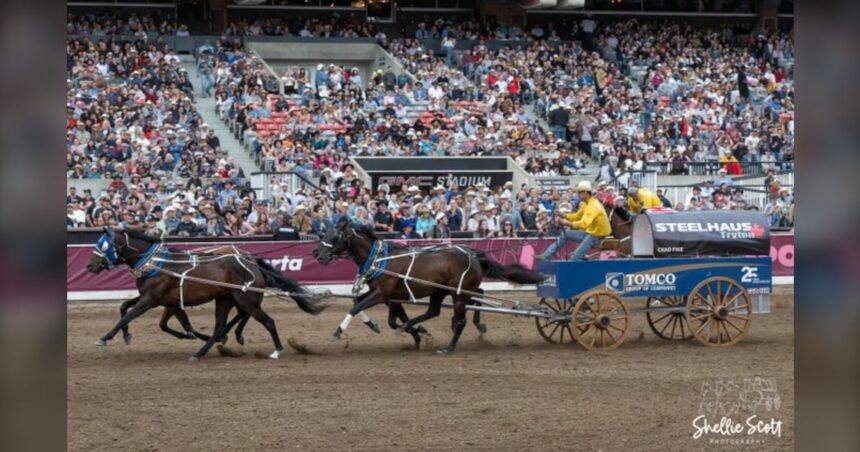The tragedy at this year’s Calgary Stampede has once again ignited debate about one of the event’s most controversial traditions. On Saturday evening, as thousands cheered from the grandstands, few realized a devastating scene was unfolding during the chuckwagon races.
A horse suffered catastrophic injuries during the evening heat, leading to the difficult decision to euthanize the animal. The incident marks another somber moment in the Rangeland Derby’s troubled history.
“The horse sustained a fractured leg that was deemed irreparable by veterinarians on site,” confirmed Kristina Barnes, communications manager for the Calgary Stampede. “Following thorough assessment, the medical team determined euthanasia was the only humane option.”
This isn’t an isolated incident. Since 1986, more than 70 horses have died during or as a result of chuckwagon races at the Stampede. Despite safety reforms implemented after particularly deadly years in 2005 and 2010, the dangers remain inherent to the sport.
I’ve covered the Stampede for nearly a decade, and these moments cast a long shadow over what many consider the highlight of Calgary’s summer calendar. The contrast is stark – jubilant crowds enjoying mini donuts and midway rides while veterinary teams make life-or-death decisions just yards away.
The Calgary Humane Society responded swiftly, calling for “a comprehensive review of all rodeo events where animals continue to suffer preventable injuries and death.” Their statement emphasized that “entertainment should never come at the cost of animal welfare.”
Stampede officials maintain they’ve implemented rigorous safety protocols. Each horse undergoes medical screening before races, and veterinarians are positioned throughout the track. The Stampede has reduced the number of wagons per heat from four to three in recent years and adjusted track conditions to minimize risks.
“We take every precaution possible,” said Greg Peterson, chairman of the Stampede Chuckwagon Committee. “But we acknowledge the inherent risks in competitive sports involving animals.”
Walking the grounds Sunday morning, I noticed subdued conversations among long-time Stampede attendees. Mary Clarkson, a 68-year-old Calgarian who hasn’t missed a Stampede in four decades, shared her conflicted feelings.
“I grew up with the chucks. They’re part of our heritage,” she told me. “But maybe it’s time to ask whether tradition alone justifies continuing something that repeatedly causes animal deaths.”
The economic impact of the Stampede on Calgary can’t be overstated. The 10-day festival generates approximately $282.5 million in economic benefits for the city, according to the most recent analysis by the Conference Board of Canada. The chuckwagon races remain one of the biggest attendance drivers.
Animal welfare organizations including Animal Justice have renewed calls to end the races completely. “No amount of safety modifications can eliminate the fundamental dangers these animals face,” said Camille Labchuk, executive director of Animal Justice. “Other rodeo events have been modernized or eliminated entirely – it’s time for chuckwagon racing to follow suit.”
City Councillor Kourtney Penner expressed concern about the incident on social media, suggesting it might be time for council to review the city’s relationship with Stampede events that pose risks to animals.
The financial stakes for competitors are significant. The Rangeland Derby offers over $1.45 million in prize money, representing crucial income for many drivers and their families. Many competitors come from multi-generational chuckwagon racing families who view the tradition as integral to their identity.
“We care deeply about our horses,” said veteran driver Troy Dorchester, who wasn’t involved in Saturday’s incident. “They’re athletes and partners. Nobody feels these losses more deeply than we do.”
The Calgary Stampede Board will conduct a review of the incident, as is standard procedure following any animal death. However, critics argue these reviews have led to incremental changes rather than addressing fundamental concerns about the sport’s safety.
As another Stampede draws to a close, Calgarians are left with familiar questions about balancing tradition with evolving views on animal welfare. The debate has particular resonance in a province where both agricultural heritage and progressive urban values shape public discourse.
For now, the chuckwagon races continue, though each incident like Saturday’s adds weight to calls for change. Tomorrow, thousands will again fill the grandstands, some perhaps more aware of the risks being taken in the name of entertainment and tradition.
The horses at the center of this spectacle have no choice in their participation. As our city evolves, the question becomes whether these animals should continue bearing the cost of preserving a contested tradition.







